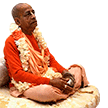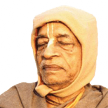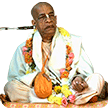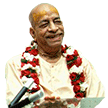Nonviolence - an essential subject: Difference between revisions
(Created page with "Category:Essential Subjects <!----------------------- edit below this line -----------------------> <!------------------------ begin introduction text below --------------...") |
(Vanibot #0041: Moves Choose Another box to the end) |
||
| Line 2: | Line 2: | ||
<!----------------------- edit below this line -----------------------> | <!----------------------- edit below this line -----------------------> | ||
<!------------------------ begin introduction text below ------------------------> | <!------------------------ begin introduction text below ------------------------> | ||
When one is under the spell of the modes of material nature, one should follow the prescribed rules for his particular situation and should not imitate others. For example, a brāhmaṇa, who is in the mode of goodness, is nonviolent, whereas a kṣatriya, who is in the mode of passion, is allowed to be violent. As such, for a kṣatriya it is better to be vanquished following the rules of violence than to imitate a brāhmaṇa who follows the principles of nonviolence. | |||
Srila Prabhupada's books, lectures, conversations and letters offer a comprehensive presentation of this essential subject as seen in the Vaniquotes '''[[Vaniquotes:Category:Nonviolence|Nonviolence]]''' category. An introduction from his books is given below in the following | Srila Prabhupada's books, lectures, conversations and letters offer a comprehensive presentation of this essential subject as seen in the Vaniquotes '''[[Vaniquotes:Category:Nonviolence|Nonviolence]]''' category. An introduction from his books is given below in the following 8 quotes. | ||
<!-------- end introduction text and don't touch next three lines ---------> | <!-------- end introduction text and don't touch next three lines ---------> | ||
---- | ---- | ||
== Quotes from Srila Prabhupada's books == | == Quotes from Srila Prabhupada's books == | ||
<!----------------- edit quote boxes below this line -----------------> | <!----------------- edit quote boxes below this line -----------------> | ||
{{VaniQuotebox| | {{VaniQuotebox|Mundane violence and nonviolence have nothing to do with the Lord's acts. A demon killed by Him attains the same result as one who attains liberation after many, many births of penance and austerity|Mundane violence and nonviolence have nothing to do with the Lord's acts. A demon killed by Him attains the same result as one who attains liberation after many, many births of penance and austerity. The word bhṛśam is significant herein because it indicates that Diti was pleased beyond her expectations. '''(Śrīmad-Bhāgavatam 3.14.51)'''}} | ||
{{VaniQuotebox| | {{VaniQuotebox|By such culture of knowledge one becomes gradually prideless, devoid of vanity, nonviolent, forbearing, simple, devoted to the great spiritual master, and self-controlled|By such culture of knowledge one becomes gradually prideless, devoid of vanity, nonviolent, forbearing, simple, devoted to the great spiritual master, and self-controlled. By culture of knowledge one becomes unattached to hearth and home and becomes conscious of the miseries due to death, birth, old age and disease. And all culture of knowledge culminates in devotional service to the Personality of Godhead, Vāsudeva. '''(Śrīmad-Bhāgavatam 1.2.28-29)'''}} | ||
{{VaniQuotebox| | {{VaniQuotebox|As a good, nonviolent man, Arjuna did not want to fight with his kinsmen, but when he understood that Krsna wanted the fight and had arranged it at Kuruksetra, he gave up his own satisfaction and fought for the satisfaction of the Lord| As a good, nonviolent man, Arjuna did not want to fight with his kinsmen, but when he understood that Kṛṣṇa wanted the fight and had arranged it at Kurukṣetra, he gave up his own satisfaction and fought for the satisfaction of the Lord. That is the right decision for all intelligent men. One's only concern should be to satisfy the Lord by one's activities. '''(Śrīmad-Bhāgavatam 3.9.41)'''}} | ||
{{VaniQuotebox| | {{VaniQuotebox|Before hearing the Bhagavad-gita, Arjuna was disturbed by the material whirlpool, by his affection for his family, society and community. Thus Arjuna wanted to become a philanthropic, nonviolent man of the world|Before hearing the Bhagavad-gītā, Arjuna was disturbed by the material whirlpool, by his affection for his family, society and community. Thus Arjuna wanted to become a philanthropic, nonviolent man of the world. But when he became budha by hearing the Vedic knowledge of the Bhagavad-gītā from the Supreme Person, he changed his decision and became a worshiper of Lord Śrī Kṛṣṇa, who had Himself arranged the Battle of Kurukṣetra. '''(Sri Isopaniṣad, Mantra 13)'''}} | ||
{{VaniQuotebox| | {{VaniQuotebox|A candidate for spiritual advancement must be nonviolent, must follow in the footsteps of great acaryas, must always remember the nectar of the pastimes of the Supreme Personality of Godhead and...|A candidate for spiritual advancement must be nonviolent, must follow in the footsteps of great ācāryas, must always remember the nectar of the pastimes of the Supreme Personality of Godhead, must follow the regulative principles without material desire and, while following the regulative principles, should not blaspheme others. '''(Śrīmad-Bhāgavatam 2.22.24)'''}} | ||
{{VaniQuotebox| | {{VaniQuotebox|Since a devotee of Lord Krsna is by nature nonviolent, and since his mind and senses are controlled, he does not have to make a special effort to acquire the good qualities which result from cultivating knowledge and performing fruitive activities|When one is freed from bondage to the results of knowledge and fruitive activities, he can attain to devotional service. Since a devotee of Lord Kṛṣṇa is by nature nonviolent, and since his mind and senses are controlled, he does not have to make a special effort to acquire the good qualities which result from cultivating knowledge and performing fruitive activities. '''(Teachings of Lord Caitanya, Chapter 13)'''}} | ||
{{VaniQuotebox| | {{VaniQuotebox|Although mundane people like nonviolence and other such brilliant qualities, God, the Absolute Truth, being always the same, is good in any activities, even so-called immoral activities like stealing, killing and violence|Although mundane people like nonviolence and other such brilliant qualities, God, the Absolute Truth, being always the same, is good in any activities, even so-called immoral activities like stealing, killing and violence. Kṛṣṇa is always pure, and He is always the Supreme Absolute Truth. '''(Śrīmad-Bhāgavatam 10.8.31)'''}} | ||
{{VaniQuotebox| | {{VaniQuotebox|Animal-killers are not even gentlemen, to say nothing of being religious men. A religious person, a devotee of the Lord, must be nonviolent. Such is the nature of a religious person|According to Nārada Muni and Vedic culture, animal-killers are not even gentlemen, to say nothing of being religious men. A religious person, a devotee of the Lord, must be nonviolent. Such is the nature of a religious person. It is contradictory to be violent and at the same time call oneself a religious person. Such hypocrisy is not approved by Nārada Muni and the disciplic succession. '''(Caitanya-caritāmṛta, Madhya-līlā 24.272)'''}} | ||
<!----------------- edit quote boxes above this line -----------------> | <!----------------- edit quote boxes above this line -----------------> | ||
| Line 31: | Line 31: | ||
'''Nonviolence - [[Vaniquotes:Category:Nonviolence|explore more within this category]]'''. | '''Nonviolence - [[Vaniquotes:Category:Nonviolence|explore more within this category]]'''. | ||
{{EsentialSubjectTotal}} | {{EsentialSubjectTotal}} | ||
<div style="float:left;"> | |||
{{EssentialSubjectnav}} | |||
</div> | |||
__NOTOC__ | __NOTOC__ | ||
__NOEDITSECTION__ | __NOEDITSECTION__ | ||
Latest revision as of 17:01, 22 November 2020
When one is under the spell of the modes of material nature, one should follow the prescribed rules for his particular situation and should not imitate others. For example, a brāhmaṇa, who is in the mode of goodness, is nonviolent, whereas a kṣatriya, who is in the mode of passion, is allowed to be violent. As such, for a kṣatriya it is better to be vanquished following the rules of violence than to imitate a brāhmaṇa who follows the principles of nonviolence.
Srila Prabhupada's books, lectures, conversations and letters offer a comprehensive presentation of this essential subject as seen in the Vaniquotes Nonviolence category. An introduction from his books is given below in the following 8 quotes.
Quotes from Srila Prabhupada's books
Nonviolence - explore more within this category.
Vanipedia has now over 903 introductory articles compiled from Srila Prabhupada's books under the series titled Essential Subjects. All these articles can be seen in the Table of Content on the right side of this article and also here in this Umbrella Category. Browse through them to relish the breadth and depth of Srila Prabhupada's teachings - There is a subject for everyone.







